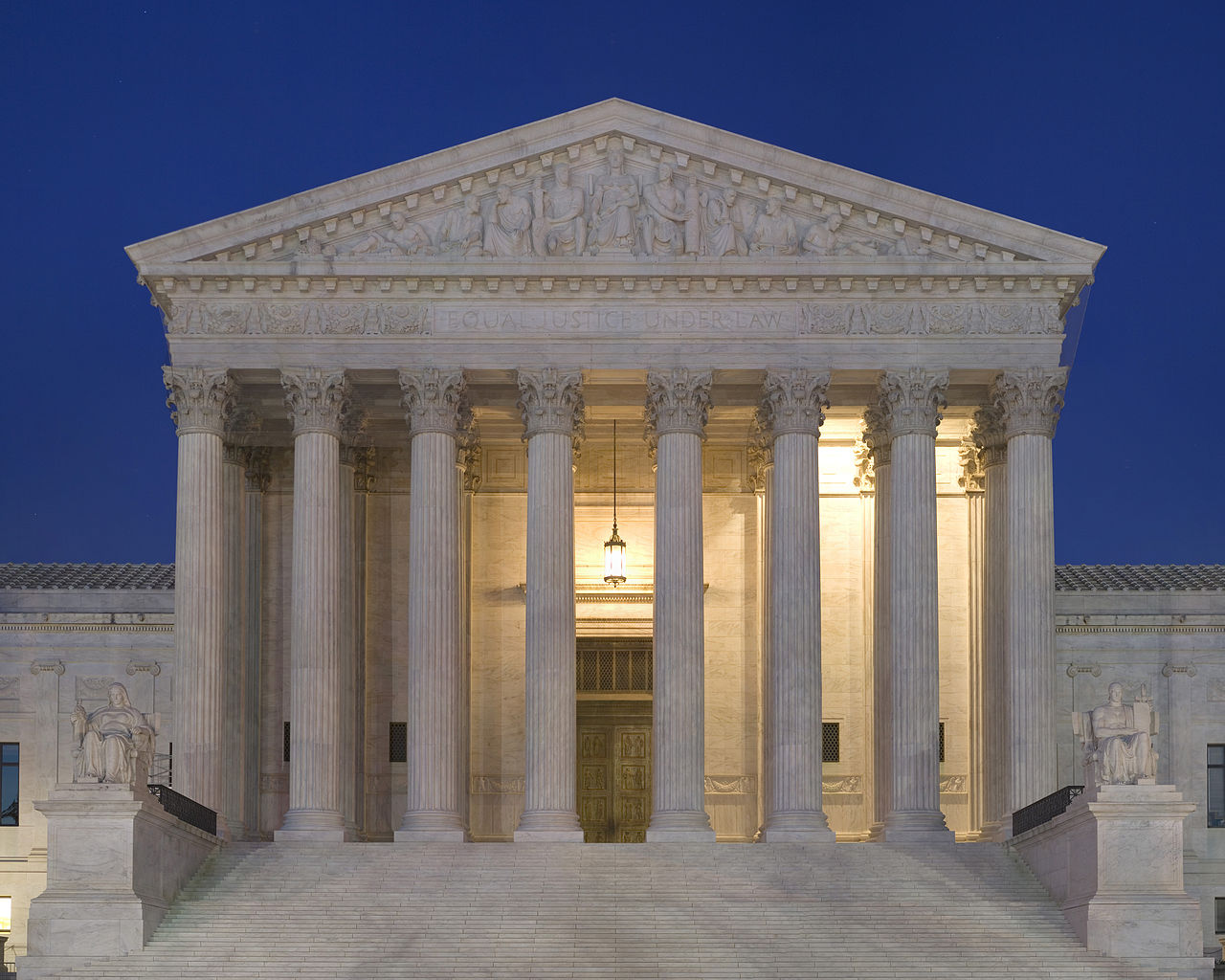The American presidency has ramifications far beyond the executive branch. It can lend the victor’s party a boost in Congress, influence statewide elections, and have deep repercussions in foreign countries. But what a lot of people often forget is that the presidency also affects the judiciary—perhaps most directly—as all federal judges are appointed by the president.
The ability to select the judiciary is substantial but will likely be markedly more powerful for whoever wins the 2016 race for one key reason: By the end of the next president’s term, four justices of the Supreme Court will be over 80 years of age: Ruth Bader Ginsburg, Antonin Scalia, Anthony Kennedy, and Stephen Breyer (in descending order of age). There is a very good chance that at least one, if not all four, of these justices will retire within the next four years.[1] This means that not only could the liberals in the Court lose two of their most reliable and influential members (Ginsburg and Breyer), but the Conservatives could also lose the loudest defender of originalism (Scalia), and the reliable swing vote in the Court (Kennedy) may no longer exist.
The potential for a radical change within the Court should be abundantly clear. Four nominations, given the remaining members of the Court, could hand a guaranteed majority to either side of the Court, even if the president is forced to nominate someone chosen by the other party as a concession. Given how infrequently the Court changes—every president since Reagan has at least one nominee still sitting—the next president will set the tone for the Court until well after his or her presidential library is built.[2] This is a lot of power in a normal election, but in 2016 it is absolutely critical because one party, the GOP, has a problem with the Supreme Court.
The CNN Republican Debate in the Reagan Library on September 16, 2015 dealt with plenty of issues that are important to the party’s primary voters, and ideally to the general electorate overall as well. Most of them have already gotten the standard thinkpiece treatment: the environment, Planned Parenthood, the military, the economy—the list goes on. One issue, however, did not get as much of a response as it should have.
Ted Cruz was asked if George W. Bush made a mistake in nominating John Roberts to the Supreme Court, citing accusations that Roberts had taken the “Democratic side” on some key issues such as the Obamacare cases. Cruz not only thought that Roberts was unqualified, but that Justice Souter was, as well.[3] It is at this point important to note that among the Republican candidates, Cruz is uniquely qualified to speak about the Court, having served as the Solicitor General for the state of Texas and clerking for Justice Rehnquist. However, he seems to be at least somewhat mistaken if he really is just questioning resumes.
Roberts went to Harvard for both undergraduate and law school, clerked for Henry Friendly and William Rehnquist, and held positions within the federal government as a lawyer and advisor for nearly a decade, all before serving on the Court of Appeals for the District of Columbia for two years.[4] Souter likewise received both his A.B. and J.D. from Harvard (and was a Rhodes Scholar), worked as a lawyer for the New Hampshire government, eventually serving as Attorney General for a decade, went to the bench for New Hampshire for another twelve years, and then went from the First Circuit to the Supreme Court within a year.[5] These two men may be many things, but unqualified is by no stretch of imagination among them.
The problem with Cruz, though, was not simply that he did not feel Roberts and Souter should not have been given the job. In fact, that would be a fairly reasonable response; there are plenty of highly-educated judges out there who would have been similarly as experienced. It was why he felt they should not have been. He saw them as not conservative enough to have been chosen by George H.W. Bush and W. The implication that Jeb Bush would continue the tradition of Bush presidents choosing secretly liberal justices was not lost on the audience. Cruz, however, would not be so easily fooled into choosing unproven candidates; no, he would have nominated the “rock ribbed conservative[s]” Michael Luttig and Edith Jones.[6] Mr. Luttig has left the bench for a position at Boeing; Ms. Jones still serves on the 5th Circuit. At no point did Cruz say why, aside from them being conservative, these two would have made better picks. At one point it seemed as if he were implying that Souter and Roberts had less of a work history, so they would be more acceptable to Congress, and the father and son Bush had taken the easy route, rather than fighting for the wiser judges.
This highlights deeper issues that the Republican Primary field has with the Supreme Court. Huckabee has decried the decision in Obergefell v. Hodges, the case that legalizes same-sex marriage, since it was decided, even going so far as to support Kim Davis, the Tennessee clerk who refused to issue marriage licenses.[7] When Mr. Trump was confronted with the fact that parts of his policy plan were in contravention of the Fourteenth Amendment he declared that “many of the great scholars say anchor babies are not covered.”[8] The veracity of his statement is doubtful at best. Yet the problem is not that he just says that and gets away with it, but that he still has yet to take any real flak for any comment he’s made on just about any issue. It was the response the candidates received for slamming the Supreme Court. Roars of applause burst forth from the people who “really understand the Constitution” for the people that know better than nine of the allegedly finest Constitutional thinkers America has. Making political hay out of the justices has become almost ridiculously easy. The justices smack of the Ivory Tower! They do not understand the common citizen, the real heart of America! They all have an agenda just like the rest of Washington!
The problem here should be troubling for anyone who believes in an effective check against the Executive and Legislative Branches. Politicizing the nomination process more than it already is means that ideological purity will replace experience, education, and accomplishments as credentials. This encourages those who actually want to advance as a judge to become more ideological in their rulings, both liberal and conservative. This can, and will, have real-world, and likely damaging effects on the populace. That is, of course, a worst case scenario, so let’s look to a more realistic outcome now.
The Republican field continues to portray the Supreme Court as, to borrow a phrase from Plato that Mr. Cruz felt would be apt, “philosopher kings.”[9] The notion that the nine justices somehow get to “legislate from the bench” continues to persist, despite the fact that they can only issue rulings on cases that manage to get to them and then can only issue a ruling based on the cases as presented to them. Of all the candidates running, Ted Cruz should best understand how inaccurate this portrayal is and how persuasive it is to the common American.
The Supreme Court is by its nature an elitist institution–the highest court in the country presided over by its brightest judges is just forced to be. For a Republican running in 2016, in a primary that has been solidly anti-establishment and anti-elites, this presents a problem. The Supreme Court has issued rulings solidly amenable to their bases of support. After all, without Citizens United, multiple candidates in the running would not even have a campaign due to an inability to collect funds outside the establishment. The Supreme Court could be an ally, or at the very least a neutral actor. This is, of course, nothing terribly new for the Grand Old Party, since at least as far back as the Tea Party Wave there have been inklings toward a very specific view of the Court. Rulings generally seen as favorable are not wins; rather, they were what was meant to happen. There are no celebrations or congratulatory comments made by politicians to the justices. Super PACs were meant to exist, the Second Amendment clearly and unambiguously protects the individual right to gun ownership. Contrast this with the Democratic response to such cases as marriage equality, where SCOTUS was looked up to as a correcting body on the right side of history in its interpretation of the 14th Amendment, and the separation becomes a bit more apparent.
For many conservative voters, the Supreme Court can only either perform its function or go against the will of the people, not unlike their view of the government writ large. This is seen throughout the GOP field: Bush and Kasich are slammed for being wonky and boring (read: heavy on the specifics of policy), whereas Carson, Trump, and Fiorina are at best decent on the specifics, but ladled heavily with invective rhetoric and have enjoyed massive polling jumps for it in the available data. The Supreme Court doesn’t deal in rhetoric, for the most part. Rather, the language of a decision, dissent, or joining statement is thick with legal terms, definitions, philosophy, and prior cases. It really cannot be spun into a simple line like cutting taxes or vetoing government spending; rather, it will articulate how donations to political campaigns can qualify as freedom of speech for the various reasons. To the average American, this is boring. And in the 2016 race, boredom is the enemy.
The Republican Party, however, is not just one class of voter. Rather, after the hard work of Reagan to establish a coalition, there are many more moving pieces here than just the average working- to middle-class white American. Two other and significant parts of the party have been crucial to this and every election cycle since then: the Evangelical Christian and the economic elite. The latter of these two groups (shockingly, considering how much impact they usually have) does not have a terrible amount at stake in the 2016 election and plays a small role as a result. For these voters, and equally importantly, donors, the main issues tend to be economic in nature, so questions about trade, financial reform, and wages tend to dominate. As far as they are concerned, the main way to approach that is to influence the legislative branch at the federal, state, and local levels. The judiciary is too static to really be adjustable enough.
For the Evangelical Christians, however, the stakes are as high as they have ever been. While this is a bit of a simplified generalization, the fundamental Evangelical sees an America that has turned its back on God. Many, if not all, of their complaints boil down to the simple notion that legislatures are passing laws that are increasingly unacceptable to their faith. They see only two ways to protect their way of life (which arguably doesn’t seem to be all that under attack in a country that is 70.6% Christian).[10] The first way is to influence legislature, especially in their home states, to keep the government at bay as seen in the multitude of Restoration of Religious Freedom laws around the country.[11] The other way, for when the first one fails, is through the courts. Here too, however, we see a similar narrative as before: the Supreme Court does the “right” thing and is ignored or protested on the grounds that it insults the words of their particular understanding of God. The Supreme Court cannot win with this demographic–it’s a part of government, and government is inherently bad.
Placed in a broader context, attacking a branch of government is hardly new for the Republican Party. The Republican candidates are capitalizing on the common ignorance, forcing an intricately nuanced and complicated, sometimes excessively so, part of government to be black and white. A politicized and mistrusted Supreme Court cannot serve the public interest. This would only make the nomination process harder, with the party in power demanding an orthodoxy that makes nominees unpalatable to the opposition. Younger judges in lower courts who aspire to higher offices will be incentivized to sensationalize their decisions rather than ensure a wise opinion, knowing that “their party” will protect them. Most importantly, in 2016, four seats on the Supreme Court will be potentially open to nominees from a president that has a chance at a second term, drawing from a pool of judges that are watching this same race. Ted Cruz wants someone more conservative than Roberts, even after Robert’s decision in Citizens United is how Cruz’s campaign has the funding that it does. The majority of the Republican candidates seemed to agree that certainly they would appoint a true conservative to the bench as well. The Republican primary field is playing a very dangerous game with high stakes and low rewards. Hopefully they realize making the base hate the Supreme Court is only going to hurt the nation in the long run before they go all in.
References:
[1] “Biographies of Current Justices of the Supreme Court.” Biographies of Current Justices of the Supreme Court. Accessed November 22, 2015. http://www.supremecourt.gov/about/biographies.aspx.
[2] Ibid.
[3] Svitek, Patrick. “As Cruz Sours on Roberts, Past Support Draws Attention.” The Texas Tribune. September 17, 2015. Accessed November 22, 2015. http://www.texastribune.org/2015/09/17/cruz-sours-roberts-bush-takes-notice/.
[4] “Biographies of the Current Justices of the Supreme Court.” Supreme Court of the United States. Accessed November 22, 2015. http://www.supremecourt.gov/about/biographies.aspx.
[5] Ibid.
[6] Svitek, Patrick. “As Cruz Sours on Roberts, Past Support Draws Attention.” The Texas Tribune. September 17, 2015. Accessed November 22, 2015. http://www.texastribune.org/2015/09/17/cruz-sours-roberts-bush-takes-notice/.
[7] Huckabee, Michael. “Free Kim Davis Now.” Mike Huckabee for President. Accessed November 22, 2015. http://www.mikehuckabee.com/freekimdavis.
[8] Carrol, Lauren. “Trump: ‘Many’ Scholars Say ‘anchor Babies’ Aren’t Covered by Constitution.” Politifact. August 25, 2015. Accessed November 21, 2015. http://www.politifact.com/truth-o-meter/statements/2015/aug/25/donald-trump/trump-many-scholars-say-anchor-babies-arent-covere/.
[9] Farias, Christian. “Ted Cruz Doesn’t Love Chief Justice Roberts Like He Used To.” Huffington Post. September 14, 2015. Accessed November 21, 2015. http://www.huffingtonpost.com/entry/ted-cruz-john-roberts_55f701e6e4b077ca094fcbaa.
[10] “Religious Landscape Study.” Pew Research Centers Religion Public Life Project RSS. May 11, 2015. Accessed November 21, 2015. http://www.pewforum.org/religious-landscape-study/.
[11] “State Religious Freedom Restoration Acts.” National Coalition of State Legislatures. October 15, 2015. Accessed November 21, 2015. http://www.ncsl.org/research/civil-and-criminal-justice/state-rfra-statutes.aspx.



